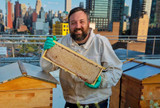Blue Sky Bee Supply Blog
Unleashing the Sweet Potential: A Comprehensive Guide to Honey Marketing
Introduction:
In the buzzing world of beekeeping, producing high-quality honey is just the beginning. To transform your beekeeping hobby into a profitable venture, mastering the art of honey marketing is essential. Whether you're a seasoned apiarist or a budding beekeeper, this comprehensive guide will equip you with strategies to market your honey effectively, enhance your brand, and boost your sales. Let's dive into the sweet potential of honey marketing!1. Understanding Your Market: The Foun
…
May 17th 2024
Beekeeper in the Big Apple
Home to the busiest streets in America, cars lined bumper to bumper, herds of young professionals making their way through the surge of rush hour; New York City might be the last place you would think hundreds of colonies of honeybees would call home. Queens-based beekeeping master Nick Hoefly of Astor Apiaries shared with us his ongoing journey as a beekeeper on the rooftops of New York City.Nick is a certified master beekeeper and Apiary Manager of The Bee Conservancy, a nonprofit ba
…
Sep 28th 2022
Robbing Honeybees: Detection and Prevention
As a beekeeper, it is important to be able to understand what
robbing is and how to recognize the behavior. Robbing describes the activity of honeybee invasion on another hive and loot their honey stores. The process is not all that easy; the honeybees will fight the resident bees until they reach the stores even if it means death. The bees break open capped cells, fill their stomachs, and return to their own hive.
Robbing is evident primarily during the late summer to early fall. Robbin
…
Sep 22nd 2022
A Day With Dolly Neely
Can you recall the exact moment you realized you wanted to become a beekeeper? For Jenean “Dolly” Neely, beekeeping is a saving grace, her catalyst in doing better for the world of living things. Dolly is a farmer who works to better the life of domestic farm animals, an array of exotic birds, and eventually, the lives of helpless rodents like Possums once she earns her license. Dolly is a one-of-a-kind farmer and beekeeper.Dolly grew up in the rural acres of Clarion, Pennsylvania, the same stat
…
Aug 18th 2022
Varroa Mites and Treating Your Beehive
Varroa Mites and Honeybees
Mite infestations can cause newborn honeybees to have malformed wings, legs, and bodies. Rising mite populations are believed to result from drifting bees, especially drones4. In adult bees, varroa mite infestation can affect their ability to fly, their orientation, and navigational skills3. As they kill off working bees, the colony suffers and are then unable to care for the larval bees. The progression of varroa mite infestation eventually results in the col
…
Aug 9th 2022





